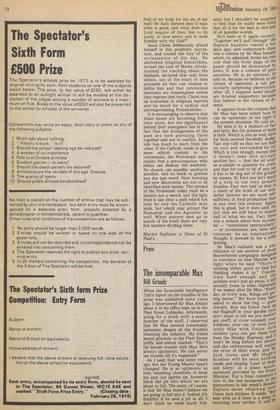Religion
Renewed protest
Martin Sullivan
Protestantism is in the air once more. A few years ago it seemed discredited and so many clergymen were anxious to be known as Catholics that they winced when the word Protestant was applied to them. They kept it as a term of contempt for churchmen who in their opinion did not possess or express the fullness of the Christian faith. But now all is changed. The Reformation is happening again and in the van this time is the Roman Catholic Church herself. Her members are busily engaged trimming her doctrines. Infallibility is seriously questioned, celibacy of the clergy challenged and flouted, the Mass offered in the vernacular, the ritual simplified, the Bible finding its way via the Jerusalem edition into the hands of the faithful. Two Commissions authorised jointly by the Pope and the Archbishop of Canterbury, have lately met and issued agreed statements on the Eucharist and Ordination. The findings seem acceptable to both churches, and Anglican Orders, the validity of which was dismissed by the Apostolicae Curae in 1896, now appear to be recognised by the Church of Rome. Free Churchmen are also happy with the results. The Roman Church is pushing out well beyond the frontiers of the second Vatican Council.
It is good to see this great church protesting, making in Dr Johnson's definition "a solemn declaration of resolution, fact or opinion". On the other hand, the Protestant also has a part to play. He needs to be rescued from his negative associations. The main function of Protestantism is to check the corruption which attacks institutional religion. If it is true that the ideal creates the organisation, and the organisation tends in turn to destroy the ideal, and if the church does not escape from this devastating process, then the Protestant is the prophet she needs. The Old Testament seers brilliantly filled this role and constantly protested in God's name, that religion was not just a matter of sacrifice and ritual, but of justice, mercy and truth. No one expresSed this more cogently than Micah whose splendid outburst is a Protestant charter, "wherewith shall I come before the Lord, and bow myself before the high God? Shall I come before him with burnt offerings, with calves of a year old? Will the Lord be pleased with thousands of rams, or with ten thousands of rivers of oil? Shall I give my first born for my transgression, the
fruit of my body for the sin of my soul? He hath shewed thee 0 man what is good, and what doth the Lord require of thee, but to do justly, to love mercy and to walk humbly with thy God?"
Jesus Christ deliberately placed himself in this prophetic succession, and roused the fury of the ecclesiastics of his day. He abolished religious hierarchies, revised the Law of Moses, revolutionised the teaching about the Sabbath, declared that only from within, out of the heart of man proceeds all that can cleanse or defile him and that ceremonial exercises are meaningless unless they express that truth. Christ was an iconoclast in religious matters and he stood for a radical and uncompromising Protestantism.
It is encouraging to observe that these issues are becoming lively once more, but the significance behind their emergence lies in the fact that the protagonists of the past are now pursuing them together and not in conflict. Each side has much to learn from the other. If the Catholic needs to give more ethical content to his ceremonial, the Protestant must realise that a preoccupation with ethics can destroy the aesthetic. No church can possibly unchurch another, and no book or prelate has the last word. New learning and new discoveries are not to be identified with heresy. The symbol of the Protestant today must be a lantern not a sword, and the light from it can clear a path which not only he and the Catholic may walk, but which may attract the Humanist and the Agnostic as well. When sincere men go in search of the truth there are very few barriers dividing them.
Martin Sullivan is Dean of St Paul's.



































 Previous page
Previous page